Predictions are that religious beliefs, or lack of them, once again will influence the U.S. 2016 presidential nomination contests about to happen in South Carolina and Nevada over the next week for both major political parties.
Republicans in South Carolina and Democrats in Nevada chose their candidates on Saturday, Feb. 20. Republicans in Nevada pick theirs on Feb. 23, and Democrats in South Carolina on Feb. 27
Five faith facts about these two states were just identified by Religion News Service.
Evangelicals still matter in South Carolina. The faith vote in this state is significant. Even Vermont Sen. Bernie Sanders, an irreligious Jew, bowed his head while attending a prayer breakfast organized by African-American faith leaders in Columbia, S.C., on Tuesday, Feb. 16.
The share of South Carolinians who identify as white and Christian dropped 16 percentage points, to 50 percent, between 2007 and 2015, according to Public Religion Research Institute.
White evangelical Protestants, the group that tends to favor son-of-a-pastor Sen. Ted Cruz, declined 10 percentage points. Remaining at 26 percent in 2015, this is still the largest single grouping based on religious self-identification, cites RNS.
White mainline Protestants, such as Donald Trump, Ohio Gov. John Kasich and former Secretary of State Hillary Clinton, are now at 16 percent, down from 22 percent in 2007.
Only one group has held steady in eight years. White Catholics, such as former Florida Gov. Jeb Bush, make up 6 percent of South Carolina voters. Hispanic Catholics, such as Sen. Marco Rubio, increased slightly, reaching 3 percent in the same time period.
Two groups that have traditionally been sources of strength for Democrats have shown increases, according to RNS.
Black Protestants, with Ben Carson, a Seventh-day Adventist, being an exception to the leaning-left majority, are now the state's second-largest religious group at 19 percent, up slightly from 17 percent in 2007. And South Carolina has a significant number of "nones" - people who claim no religious identity. They're now 17 percent, up from 10 percent in 2007, according to PRRI.
In Nevada, nones matter more. People with no religious identity, the so-called nones, make up a significant 30 percent of Nevada residents, up from 22 percent in 2007, according to PRRI. Many in this group seem to be attracted to Sanders.
White mainline Protestants grew slightly, but still represent only 13 percent.
Meanwhile, evangelicals remain at 10 percent, unchanged in eight years. Catholics also held steady, at 12 percent, between the 2007 race and the 2015 start of the 2016 campaign.
The two groups showing the biggest declines in religious market share were Mormons (down to 6 percent from 11 percent) and Hispanic Catholics (down to 9 percent from 13 percent.)
Religion continues to impact issues in the news. Considering all the interest and debates about whether President Obama should nominate a replacement for Supreme Court Justice Antonin Scalia, who died suddenly on Feb. 13, has kept both Democrats and Republicans conversing about the hot topic.
The current candidates' response to any prospective justice may be shaped by the nominee's religion, as well as his or her political ideology and legal views, suggests RNS. And candidates' own religious beliefs might influence their preferences, or objections, to a nominee.
There are no Protestants on the high court now. Scalia was Catholic, as are five other justices, with the remaining three Jewish.
At the end of prior primaries, there's (almost) always mention of God - or not. RNS suggests poeple should expect victory, or concession, speeches in South Carolina and Nevada to have "tweet-able mentions of the Almighty." Sanders, on the other hand, left out God but still made a moral plea in his victory speech about moving away from fossil fuels to sustainable energy.
Super Tuesday could change it all. National religious trends will matter more when 14 primaries or caucuses are held March 1 for one or both parties. Voters will choose candidates in states from the Bible Belt to one of the nation's least religious states, Sanders' home base of Vermont. (Voting opens March 1 through 8 for Democrats living abroad.)

















